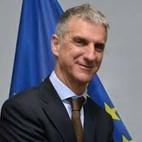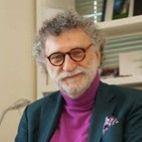PoliTO is a leading European University of technology, highly concerned with Energy & Climate issues, either addressed in science and research, public policy, or business and industry. In 2024 Politecnico launched the Foresight & Strategic Planning Initiative (FSP Initiative) to coordinate more effectively PoliTO's international networking strategy, especially given nowadays growing signs that climate change is accelerating and energy issues are becoming increasingly complex.
PoliTO has set up in 2024 an Energy & Climate High Level Group (HLG) under the initiative of the Rector Stefano Paolo Corgnati, to enrich the FSP Initiative, by gathering a team of ten top-level and independent European experts (from Belgium, Finland, France, Germany, Ireland, Italy, Latvia, and UK) highly qualified on economics, technology, European law and policy. The team serves our University’s mission of foresight and planning.
The members of HLG meet two/three times a year, to discuss and offer a 360-degree review of trends, innovations, opportunities and findings that can make a difference in the European journey for energy transition, and in the building of valuable research topics, policy choices and technological tools. Being a technology producer and supplier, Politecnico requires a comprehensive international perspective, along with expert advice and recommendations.
A few days before each meeting, the FPS Initiative will provide a list of topics and a brief position note to serve as a basis for discussion. A “Takeaways Note” document will be released after the meeting.

Director of the Foresight and Strategic Planning Initiative at Politecnico di Torino. Additionally, he serves as the Head of the Technical Secretariat for the Rector of Politecnico di Torino, is a Visiting Professor at Politecnico di Torino, and holds the position of Professor of Sustainability and Circular Economy at the University of Pisa.
Previously, he was Director at the Joint Research Centre of the European Commission, where he was responsible for managing projects and expert groups in the fields of energy, transport, mechanical and nuclear engineering, and environmental sciences.
Giovanni holds a mechanical and nuclear engineering degree from the University of Pisa and a Ph.D in fluid dynamics from the Technical University of Munich, Germany.

Co-Chairman
Senior advisor of the Foresight and Strategic Planning Initiative at Politecnico di Torino, and Part-time Professor of the Florence School of Regulation. He worked in the industry and private sector before becoming a professor of Economics at La Sorbonne. He is the executive V.P. of IAEE (International Association for Energy Economics) and the former V.P. of its French Section. He has been advisor of DG TREN, DG COMP and DG RESEARCH at the European Commission and of the French Energy Regulatory Commission (CRE). He has served as coordinator and scientific advisor of several European research projects. He was the Director of the Florence School of Regulation at the Robert Schuman Centre for Advanced Studies of the European University Institute and holder of the Loyola de Palacio Chair in European Energy Policy & Regulation. Jean-Michel was the founding editor-in-chief of EEEP: “Economics of Energy and Environmental Policy” (an IAEE journal) and currently is a member of the Board of Editors of ‘Energy Journal’ since 2012.
Jean Michel took his Ph.D. in Economics at La Sorbonne, France.

Full Professor at KU Leuven. His research interests include smart grids, security of energy supply, techno-economic aspects of the liberalisation of the electricity market, and energy system modelling. In Belgium, Professor Ronnie Belmans was co-founder and chairman of EnergyVille, a research collaboration in Genk specializing in sustainable energy and intelligent energy systems, in cooperation with VITO, imec & UHasselt. From 2016 to 2022 he was chairman of the board of directors of the VREG, the Flemish regulator for electricity & gas markets. He is also a member of the board of directors of Niko and SCK/CEN and president of Scone. Ronnie Belmans is also the honorary chairman of the board of directors of ELIA, the Belgian transmission system operator.
Ronnie received his MSc degree in electrical engineering and a PhD degree, both from KU Leuven, Belgium. In 1989, he obtained a Special Doctorate from the KU Leuven and in 1993 a ‘Habilitierung’, from the RWTH, Aachen, Germany.

Professor of European Law at the University of Tilburg, the Netherlands, and part time Professor responsible for EU Energy Law and Policy at the Florence School of Regulation, EUI, Florence, Italy. She is also a Research Associate at the Energy Policy Research Group (EPRG), at the Judge Business School, Cambridge University. Leigh is Senior advisor at Bakerbotts, Brussels, and she has recently been re-elected to the 'Mijnraad' - a body which advises the Dutch Ministry of Economic Affairs on various issues in the context of oil and gas exploration and production licensing. Leigh is skilled in European competition and regulatory law. Over the past three decades, she has worked extensively on advising a wide range of clients in regards to European energy law, European state aid law and European health law.
Leigh studied law at the Universities of Glasgow and Sheffield, and at the EUI. In 1989 she obtained, with distinctions, her doctorate in law at the University of Leiden.

Adviser to the President of Latvia and former Commissioner for Energy (Barroso I) and for Development (Barroso II). Andris is a Professor at the European University Institute and serves as the Chairman of the Implementation Committee of the International Methane Emissions Observatory. With a distinguished career in public service, Piebalgs previously covered key roles as the European Union Commissioner for Energy and later as the Commissioner for Development. He was influential in shaping the EU’s renewable energy and energy efficiency policies, significantly contributing to the establishment of the European energy market. Before his work with the European Union, Piebalgs was a prominent Latvian politician and diplomat. As Latvia’s Ambassador to the EU, he played a pivotal role in facilitating Latvia’s accession to the European Union.
Andris is a graduate in Physics from the University of Latvia.

Part-time Assistant Professor at the Florence School of Regulation. He is also a Senior Director at FTI Consulting in London, working on projects related to power market design and regulation across the globe. He is affiliated with the MIT Energy Initiative (MITEI) and the MIT Center for Energy and Environmental Policy Research (CEEPR). Previously, he was a Senior Lecturer at the MIT Sloan School of Management, where he instructed the course “Engineering, Economics and Regulation of the Electric Power Sector”, a Research Scientist at the MITEI and a Research Fellow at FSR.
Tim graduated as an engineer from Ghent University, Belgium and completed the EMIN program, an international master's programme in economics. He holds a PhD in energy economics from University Paris-Sud XI.

European Coordinator for the Baltic Synchronisation projects of Common Interest, Catharins is also the former Director for Green Transition & Energy System Integration at DG Energy (European Commission). She recently joined the Florence School of Regulation at the EUI’s Schuman Centre. She entered in the European Commission in 1997 and was the Director responsible for Green Transition and Energy System Integration in the Directorate General for Energy until retiring in 2024. Before that, she led Units in charge of Consumers, Local Initiatives, Just Transition, as well as of Networks and Regional Initiatives. She has also worked on international transport, trans-European network policy and financing, internalisation of external costs, and strategic policy research. Before joining the Commission, she was a team leader and chief economist in the private sector in Finland. She has also worked for the United Nations Development Programme in Port-au-Prince, Haiti.
Catharina holds a Master of Economics degree from the Aalto University, Finland.

Full Professor of Finance Science, she is a member of the Board of Trustees of the University of Milano-Bicocca and Rector’s Delegate for the University Sport. From 2001 to 2012, she served in the Department of Legal and Economic Systems, which she directed from 2009 until 2012, when she moved to the Department of Economics, Quantitative Methods and Business Strategies. From 2012 to 2015, she was an elected member of the Academic Senate for the Legal-Economics-Statistics macro-area, and from 2015 to 2018, she was the director of the Department of Economics, Quantitative Methods and Business Strategies. Her research activity deals with the theory of regulation and auction mechanisms applied to public utilities. In particular, she has authored theoretical and applied works devoted to the study of the energy sector. She is the author of international publications on the subject of Power Exchanges, economics of renewable sources and management of cross-border energy exchanges.
Lucia graduated in Law from the University of Milan, holds a Master of Science in Economics from the University of York (UK) and a PhD in Political Economy from the University of Pavia.

He is a former official of the EU Commission (1990-2019), having worked in the areas of climate, energy, transport and taxation. He worked in the Private Office of A. Piebalgs, EU Commissioner for Energy from 2007-2010, where he was responsible for renewable energy. From 2010 to 2014 he was Chief of Staff to the EU Commissioner for Climate Action, C. Hedegaard. In 2014-2015Peter was EU Visiting Fellow at St. Antony’s College, Oxford University, UK. He ended his career in public service working on the Commission’s approach to low emission mobility and at the European Political Strategy Centre, the Commission President’s think-tank. He is now a Senior Adviser at Rud Pedersen Public Affairs, Brussels. From 2020 to 2024 He was a part-time Senior Research Associate at the Florence School of Transnational Governance, European University Institute.
Peter holds a Master’s degree inHistory from the University of Cambridge, UK.

He is currently Senior Fellow at the Brussels-based Think Tank Bruegel, working on Energy and Climate Policy. His work focuses on regional and distributional impacts of decarbonisation, plus the analysis and design of carbon, gas and electricity markets, and EU energy and climate policies. Previously, he worked at the German Ministry of Finance, the German Institute for Economic Research in Berlin, the energy Think Tank LARSEN in Paris, and the policy consultancy Berlin Economics.
Georg holds a Degree in economics at Humboldt University Berlin (specialisation in statistics and economic history) and a PhD at Dresden University of Technology.